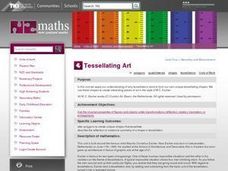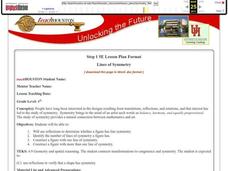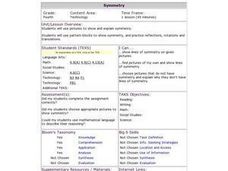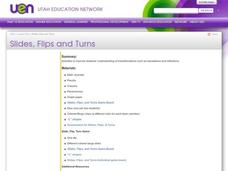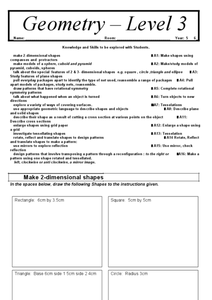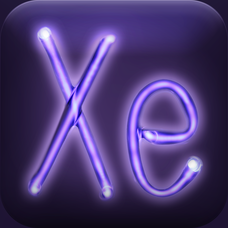Utah Education Network (UEN)
Character Changes Lesson and iPad Assignment
Round, flat, static, dynamic. As part of a characterization study, scholars review the different types of characters and create a slide show demonstrating how a dynamic character in a story they have read changes throughout the tale.
Curated OER
Investigating Transformations
In this trigonometry worksheet, students investigate the transformations that can occur to the basic trigonometric functions. The thirteen page worksheet contains explanation, examples, and forty-seven questions. Answers are not included.
Curated OER
Grandfather Tang's Story
Young scholars recognize, describe, and perform transformations (rotation/turn, reflection/flip, and translation/slide) on two dimensional shapes.
Curated OER
Logo Licenses
Third graders find all the lines of reflection symmetry in a given shape, identify the order of rotational symmetry of a given shape. They create designs which have reflection symmetry, rotational symmetry (orders 2, 3, 4, 6) and...
Curated OER
Copycats
Third graders describe the features of 2 and 3 dimensional objects and use the language of geometry. They design and make a pattern which involves translation, reflection or rotation.
Curated OER
Tessellating Art
Fourth graders create artwork showing their own unique tessellating shapes. They apply the symmetries of a regular polygon and describe the reflection or rotational symmetry of a figure or object. They share their art work with the class.
Curated OER
Lines of Symmetry
Fourth graders identify lines of symmetry using reflections and then construct figures that have one or more lines of symmetry. In this symmetry lesson plan, 4th graders use sets of shapes, pattern blocks, a mirror, and more.
Curated OER
Reflection
Eighth graders use a stencil to make a figure with which they discover the horizontal line of reflection, the vertical line of reflection, and the diagaonal line of reflection using coordinates.
Curated OER
The Spin Doctor Is In
Students are introduced to rotational inertia with some example of objects that rotates: Throw a Frisbee acroos the field and it rotates as it moves. The same is true for a baseball and a football. The two motions, translational and...
Curated OER
Transfromations
In this geometry worksheet, 10th graders solve questions that involve rotations, reflections, and dilations. The one page worksheet contains ten multiple choice questions. Answers are not provided.
Curated OER
Transformations
Tenth graders recognize, perform and derive rules for basic transformations including translation, reflection and rotation. They also consider compositions, a combination of two or more basic transformations. Students explore both...
Curated OER
Math/Technology: Symmetry
Fourth graders, using KidPix, use stamps and pencil tools to illustrate which pictures have symmetry. They add text boxes to explain their answers in math terms. Students practice skills in rotation, reflection, and translation on an...
Curated OER
Exploring and Creating Tessellations
Young scholars use translations, rotations, and reflections to create tessellations. They explore and construct several different types of tessellations including pure/semi-pure and non-regular polygon and "Escher-like" tessellations .
Curated OER
Fold and Cut 2
Second graders make, name, and describe, using their own language and the language of geometry, everyday shapes and objects. They create and discuss geometric patterns which repeat (show translation), or which have rotational or...
Curated OER
Tessellating Tiles
Second graders Make, name and describe, using their own language and the language of geometry, everyday shapes and objects. They create and talk about geometric patterns which repeat (show translation), or which have rotational or...
Curated OER
Tessellations: Use Right Angles To Explain The Tessellation of Objects
Students examine a selection of shapes and identify which shapes tessellate and why. They design and make a pattern which involves translation, reflection, or rotation. Students describe the features of 2-dimensional and 3-dimensional...
Curated OER
Slides, Flips and Turns
Third graders are introduced to different types of transformations. As a class, they describe how a stuffed animal slides across the floor and use themselves to demonstrate as well. Individually, they flip and turn in different...
Curated OER
Design Explorations: Frieze Patterns
Students will explore frieze patterns. A frieze pattern is a mathematical concept to classify designs on two-dimensional surfaces, which are repetitive in one direction, based on the symmetries in the pattern. They will explore examples...
Curated OER
Geometry Level 3
What a wonderful resource! Learners create two-dimensional shapes according to the instructions stated, use the squares to make a triangular prism, a cube, and a pyramid, and identify features of plane shapes, among a myriad of other...
Curated OER
Introducing Tessellations
Students create tessellations to increase their knowledge of the applications of geometry. They explore the different shapes of polygons.
Curated OER
Miras, Mirrors, and Kaleidoscopes!
Learners use hands-on activities to explore transformations. They view a video segment that demonstrate how M. C. Escher employed geometry and transformations to create so many of his famous drawings.
Curated OER
The Elements: A Visual Exploration
Have the building blocks of the universe at your fingertips! Visually intriguing and animated, this interactive periodic table may also be the most informative chemistry tool available!
Virginia Department of Education
High School Mathematics Geometry Vocabulary Word Wall Cards
Having a good working knowledge of math vocabulary is especially important for geometry learners. Here are 119 pages worth of wonderfully constructed definitions, constructions, formulas, properties, theorems, and postulates. This is a...
EngageNY
Congruence, Proof, and Constructions
This amazingly extensive unit covers a wealth of geometric ground, ranging from constructions to angle properties, triangle theorems, rigid transformations, and fundamentals of formal proofs. Each of the almost-forty lessons is broken...







